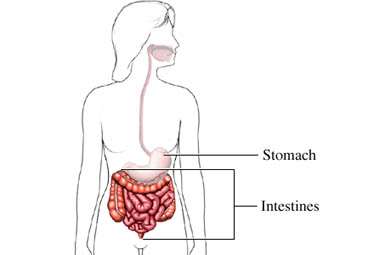Definition
Giardiasis is a common infection of the intestines. It is found all around the world.
| The Intestines |

|
| Copyright © 2002 Nucleus Communications, Inc. All rights reserved. |
Causes
Giardiasis is caused by a parasite. It can easily pass into humans after:
- Eating food or drinking water that has the parasite
- Swimming in water that has the parasite
- Contact with a person's hands contaminated by human or animal stool (poop)
- Oral to anal contact during sex
Risk Factors
Giardiasis is more common in places with poor water or sewage treatment. Asia and South America have the highest infection rates. Risk is also higher for people who:
- Live in crowded places with poor sanitation
- Drink untreated water
- Have low stomach acid or take stomach acide reducers
- Have oral to anal contact during sex
- Have a weakened immune system
- Are a day care worker or work in a group setting
- Swim in water sources that may be contaminated
Symptoms
Some people do not have symptoms. Others may have:
- Loose, watery stools that are foul-smelling
- Belly pain or cramps
- Bloating
- Gas
- Nausea or vomiting
- Weight loss
-
Rarely:
- Mild fever
- Hives or other rash
- Swelling of eyes or joints
The infection can pass to others even if symptoms are not present.
Diagnosis
The doctor will ask about symptoms and past health. They will ask about housing, health and travel history. The answers and a physical exam may point to an infection. The doctor will often test a sample of stool (poop) to diagnose giardiasis.
Others in the home will also need testing.
Treatment
Medicines will treat the infection. Other options to manage symptoms include:
- Fluids to prevent dehydration
- Avoidance of milk and milk products for 2 to 6 weeks
Prevention
Things that help reduce the risk of giardiasis include:
Washing hands often and always:
- After using the toilet
- After changing a diaper
- Before handling or eating food
When camping:
- Bringing bottled water for drinking, cooking, and brushing teeth
- Boiling, filtering, or sterilizing untreated water before using it
- Washing or peeling raw fruits and vegetables before eating
When traveling overseas:
- Using only bottled water for drinking, cooking, or brushing teeth
- Eating only well cooked food that is served steaming hot
Avoiding contact with stool during sex by:
- Using a barrier, such as dental dam, during oral-anal sex
- Washing hands after touching a condom used during anal sex
- Washing hands after contact with the anal or rectal area
Water in swimming pools should be treated as advised.
RESOURCES
Centers for Disease Control and Prevention https://www.cdc.gov
IDSA—Infectious Diseases Society of America http://www.idsociety.org
CANADIAN RESOURCES
Canadian Public Health Association https://www.cpha.ca
Health Canada https://www.canada.ca
References
Allain T, Buret AG. Pathogenesis and post-infectious complications in giardiasis. Adv Parasitol. 2020;107:173-199..
Dental dam use. Centers for Disease Control and Prevention website. Available at: https://www.cdc.gov/condomeffectiveness/Dental-dam-use.html. Accessed April 28, 2022.
Giardiasis. EBSCO DynaMed website. Available at: https://www.dynamed.com/condition/giardiasis. Accessed April 28, 2022.
Giardiasis. Kids Health—Nemours Foundation website. Available at: https://kidshealth.org/Nemours/en/parents/giardiasis.html. Accessed April 28, 2022.
Giardiasis. Merck Manual Professional Version website. Available at: https://www.merckmanuals.com/professional/infectious-diseases/intestinal-protozoa-and-microsporidia/giardiasis. Accessed April 28, 2022.
Parasites–giardia. Centers for Disease Control and Prevention website. Available at: https://www.cdc.gov/parasites/giardia. Accessed April 28, 2022.
